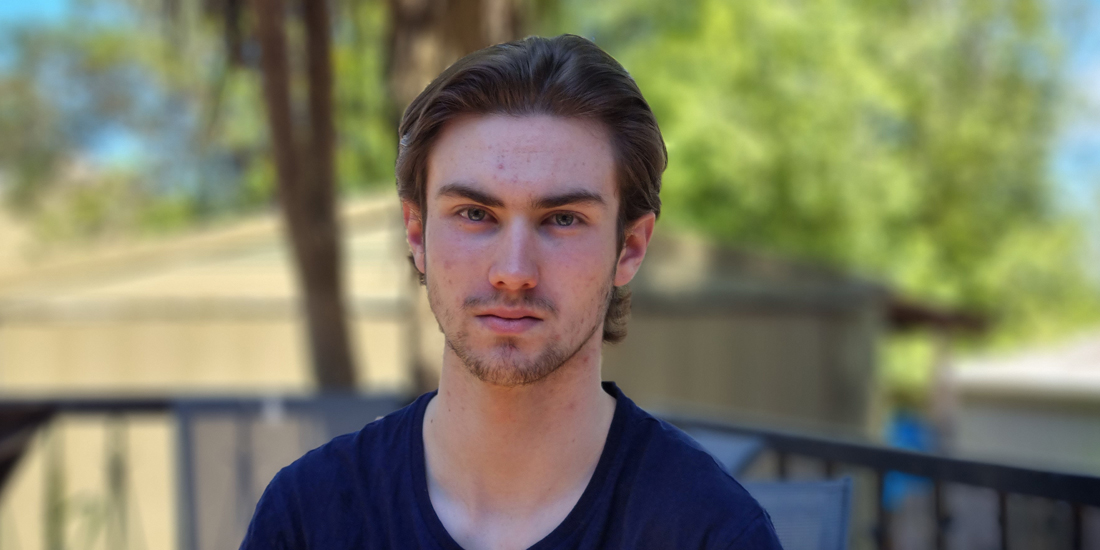Orygen is calling for the impact of climate change on young people’s mental health to become an urgent global and national priority area for research and policy.
With the Glasgow United Nations Climate Change Conference of the Parties (COP 26) opening on 31 October 2021, two young people have shared their thoughts on climate change and its impact on youth mental health.
As members of Orygen’s climate action committee, Angie and Sam contributed to the drafting of Orygen’s position statement on climate change and youth mental health, and are using their personal perspectives as young people to continue to shape Orygen’s work in this area.
Youth empowerment is on the COP 26 presidency program agenda on 5 November.
Here are Angie and Sam’s personal reflections.
Angie, Orygen Climate Action committee member

There has been increasing media coverage about climate change this year, especially with the recent Intergovernmental Panel on Climate Change report, which announced the state of the planet as “code red for humanity”.
However, even before 2021, I have always worried about global warming. This time 12 years ago when I was in primary school, I wrote a short report about climate change and the urgency to tackle this issue. I was burning with passion and hopeful for change. Fast forward to 2021, the climate crisis has only magnified and I am overwhelmed with mixed feelings of despair and desperation.
Year on year, the effects of climate change are becoming more noticeable. I have felt the frequent extreme heat of summer and smelt the burns of neighboring fires in my community – I know that this should not be the norm.
At the same time, my experiences do not compare to the devastating 2019-2020 bushfires which at that time seemed uncontrollable. I worried about the health and safety of communities, as well as our flora and fauna, in regional and rural Victoria. I felt helpless knowing that the most I could do was to donate directly to communities most impacted by climate change. The increasingly cold temperatures in winter have also impacted my physical health, leading me to develop conditions that I have never previously experienced before.
I can only speak about my own experiences, but I know that young people facing greater socioeconomic disadvantage than me are feeling the consequences of climate change more acutely. The uncertainty around how climate change will continue to impact young peoples’ environments and health in the future concerns me.
Outside of my concerns about climate change and its injustices, I am already someone with anxious tendencies. These feelings are amplified with the uncertainty surrounding the trajectory of climate change, as well as the realisation that those who are supposed to be our leaders within government and large corporations are refusing climate action.
I’m not only worried about how climate change will impact my surroundings and health today. I am also worried because it seems that the fate of my future is unfairly in the hands of a few but large powerful and polluting industries.
Their lack of climate action in exchange for economic growth feels dehumanising. It teaches society that money is more valuable than the mental health and lives of young people.
An endless stream of questions flow through my head: how long can I live in good health if this trajectory of climate change continues? What will happen when the consequences of climate change become irreversible? Is it worth having children if they (and their children) are to live with the burdens of climate change?
It scares me to know that if we do not change our actions today, that one day it will be too late – this day seems to be approaching sooner than ever. However, I want to be hopeful because I know that the window of opportunity to act and prevent devastating consequences is now.
Compared to the level of influence in government and large corporations, I am only one person.
While I do not speak for all young people, I think many may relate to feeling hopeless, helpless, and hidden when we see no change despite our attempts to be heard.
Policymakers must see and understand our distress about climate change and the impacts it will have (and is already having) on our future. The voices of young people and First Nations communities must inform policy decisions, especially as groups who are most directly affected by the issue.
The lack of lived experiences in the development of policies in history has often perpetuated and maintained health inequities in communities experiencing marginalisation. Thus, there should be more proactive efforts to collaborate with young people from diverse backgrounds in the design and implementation of policy.
The participation of young people should not be tokenistic. Instead, it should be empowering for young people who have the right to control their mental health and its determinants, which include climate change.
Young people are the future and are calling for immediate collective climate action. We must protect the mental health of current and emerging young people who do not deserve to bear the consequences of climate change due to the lack of accountability today.
Sam, Orygen Climate Action committee member

The climate crisis. It’s an unprecedented catastrophe, a buildup of the exploitation of the planet and its people. The weight of solving this colossal disaster has been put onto the shoulders of young people – the generation born into a broken world that we have been told we have to fix.
The power players of the world sacrificed the future in the process of basking in the past. We are now in that future, and it’s affecting us not only on a physical level, but on a psychological one too.
Young people are feeling the brunt of the impacts of the climate crisis, physically and mentally. The existential stress and depression of surviving in a world that, at the current rate, we very well might not get to live in, is so overwhelming.
There’s even been a term coined for it: eco-anxiety. It’s causing new challenges for a health system that hasn’t been properly equipped with the training and support resources required to help guide and support us through our stress and worry, of what’s to come, and how to deal with the dread of the future, of the actions and inactions unravelling before our very eyes.
We need to better prepare the health system so it can better support us, which also means we need more funding being put into getting help to the people who are missing out.
Our mental health system is so overloaded right now: to see a psychologist through the public health system can mean four month wait times, or even longer. That is not mental health justice, and without the proper tools to help us mentally face and act on this crisis, we are leaving those who are most vulnerable and in need of support behind.
Personally, the climate crisis, and the interconnected anxiety and depression that comes along with it, has and is affecting me in ways that I am still discovering. Already struggling with self-worth issues and an anxiety disorder, the climate crisis exacerbates it.
I have questioned countless times, if the future is one worth living in. It’s caused me to go to places in my mind that no one should ever have to go. I know things will get worse before they get better.
My privilege because of who I am, means that I will be able to access the system to gain support for my struggles. Marginalised people, First Nations communities, refugees, women and LGBTQI+ people have been and will feel the effects first and worst. So many in these communities will not be able to gain the same support I have and will be able to, because we are living in a system that was not built to support them.
Climate justice and mental health justice mean that no one is left behind. We must tear these systems down, and move forward collectively, through a decolonised lens. One that can support everyone.
To be able to mitigate and adapt, to be able to turn the tide of this crisis, it is up to all of us. Individual change may not be enough. Waiting for governments to act will take too long. So it is up to communities, localised and anti-hierarchical, to come together and support each other, through mutual aid and restorative justice. In ways that can build community care and resilience, so the weight of having to tackle this issue doesn’t rest on one person.
So, to the power players of the world, the time to act is now. No more false promises, no more smoke screens. Listen to those who are impacted most, support local communities, and break the cycle of violence against the planet and everything and everyone connected to it.
Invest in proper mental health support so we can build resilience to face the challenges that are already upon us.
For COP26 this year, set ambitious climate targets that will rapidly reduce our carbon emissions. Give communities the fighting chance and the support to create a future that we can all live in.
The best medicine to combat our climate dread is action. With action through community, love and solidarity with each other, we can shape the future we want to see.